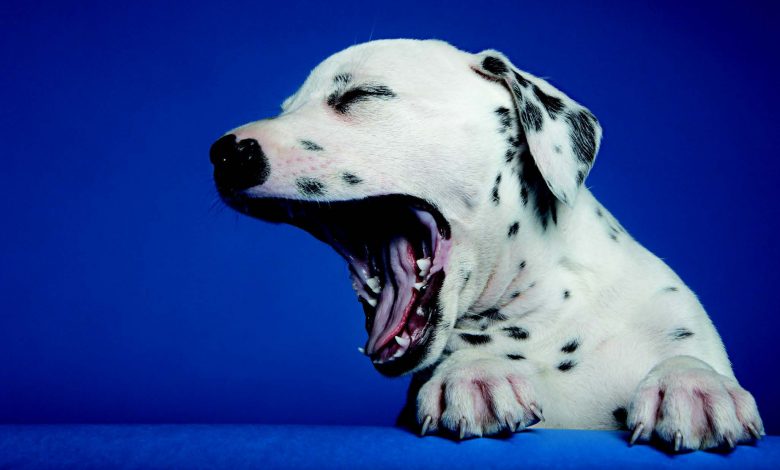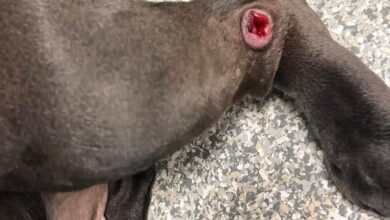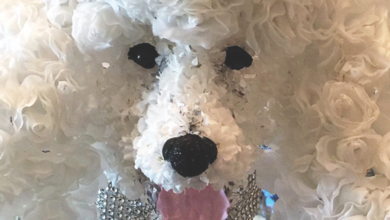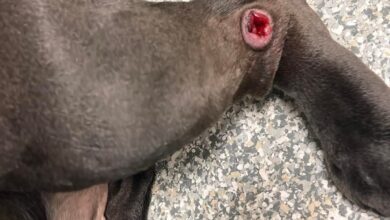Help for Kennel Cough (Canine Infectious Respiratory Disease) – Dogster

[ad_1]
Room 3 sounded like a barnyard. It was an uncharacteristically slow (and peaceful) Monday morning at my veterinary clinic. Any illusion of tranquility was shattered by what could fittingly be described as an eruption of wall-trembling goose honking. Either someone had confused me for a farm vet, or I had a pretty good idea of what lay on the other side of the exam room door — and it wasn’t a winged critter.
“Chester caught a cough at the dog park!” That was the greeting offered by a frantic-looking woman clinging to 4-year-old Chester, a normally clamorous Jack Russell Terrier, who appeared poised to burst into another coughing fit. As I entered the room, Chester sprung from her arms and landed at my feet, and immediately froze, head down, neck outstretched and legs spraddled for a series of honking hacks. Once the jag passed, he resumed bounding over to give me a hello head butt.
“He’s been coughing like this for three or four days. Neither of us can sleep, and he started acting a bit sluggish last night.”
On exam Chester had a low-grade fever, mucopurulent nasal discharge (yellow-green and somewhat thick opposed to a clear, watery nasal drip), normal lung sounds and was fairly bright and alert, although I could tell he wasn’t totally himself. He was currently immunized against the highly contagious canine influenza (CIV) but not the more common “kennel cough vaccine” of Bordetella bronchiseptica, canine adenovirus type 2 and parainfluenza. His mom said she skipped that vaccine, “because he never boarded.” Unfortunately, dog parks can pose a significant risk of many infectious diseases, and Chester’s mom may have been right about the source of the problem.
What causes kennel cough?
Kennel cough, often referred to as canine infectious respiratory disease (CIRD) or infectious tracheobronchitis, is considered one of the most common respiratory infections in dogs. Numerous organisms can cause kennel cough, including bacteria, viruses and mycoplasma. Most uncomplicated cases consist of a combination of Bordetella bacteria with either parainfluenza or adenovirus type 2 viruses.
While Chester demonstrated the classic “goose honk cough” that is easily elicited by massaging the throat area, there are many causes of coughing in dogs. In fact, I only consider “kennel cough” when there’s a clear route of infection and other conditions such as heart disease, collapsing trachea and even allergies are ruled out. In Chester’s case, all evidence pointed to CIRD as the culprit of his cough.
Diagnosing kennel cough
Diagnosis of kennel cough is commonly made on clinical signs. In severe cases, chest X-rays and blood tests may be evaluated. Unless it’s a kennel or shelter outbreak, or a breakthrough case in a vaccinated dog, I typically refrain from performing nasal, tracheal or bronchial cultures in individual cases.
The rationale is:
- the vast majority of cases are self-limiting and will improve without medical treatment;
- by the time I receive results, most dogs are doing better; and
- if viral, treatment is only supportive, meaning nothing changes.
Treatment of kennel cough
Treatment depends on the individual dog’s condition. Most cases will resolve within 10 days with only basic supportive care of:
- rest
- quarantine
- reducing barking triggers
- hydration
- good nutrition
I understand many dog parents expect to go home with a course of antibiotics, but antibacterials are medically unnecessary and could potentially lead to antibiotic resistance and more serious infections later.
If the patient is happy and alert without a fever or purulent discharge, antibiotics are not indicated. For a moderate case like Chester’s, with a fever and mucopurulent discharge, I prescribe a broad spectrum antibiotic, most often doxycycline. For patients with pneumonia, antibiotic combinations, such as clindamycin with enrofloxacin, are good choices.
For dogs coughing so much they can’t sleep (or keep their human family up), I’ll recommend:
- a cough suppressant such as hydrocodone, butorphanol or liquid codeine/promethazine
- a humidifier
- nebulizing certain medications in more advanced cases
Prevention of kennel cough
Preventing kennel cough has never been more convenient or effective. Depending on a dog’s risk profile, there are injections, intranasal drops and even oral vaccines to protect against the most common infectious organisms. Most dogs should be vaccinated annually. I also recommend canine influenza (CIV) immunization for frequent travelers or those who visit parks, shows or kennels.
For the first three days, Chester needed a cough suppressant along with a humidifier to help him get through the night. By the sixth day of treatment, Chester’s dog mom reported “he was nearly normal and only coughed a few times a day, usually after running around during potty breaks.” He’s a JRT. He’s got a yard to guard.
At our recheck visit two weeks later, Chester’s cough was a faded memory. The exam room was pleasantly absent of any honks, bleats or other cacophonous farm animal vocalizations. The family was once again enjoying restful nights, and Chester reclaimed his yardguard duties.
Three months later, Chester was vaccinated against kennel cough and cleared for dog park visits. That Christmas, we received a “Chester card” featuring a grinning Chester. A “paw-written” note read, “HONK if you love JRTs!” I loved it.
[ad_2]
Source link






